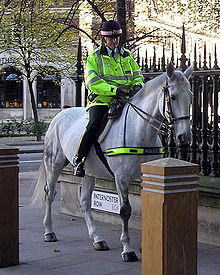 | This is a user sandbox of Sulrich8930. You can use it for testing or practicing edits. This is not the sandbox where you should draft your assigned article for a dashboard.wikiedu.org course. To find the right sandbox for your assignment, visit your Dashboard course page and follow the Sandbox Draft link for your assigned article in the My Articles section. |

National Domestic Extremism and Disorder Intelligence Unit
editNational Domestic Extremism and Disorder Intelligence Unit defined
editThe National Domestic Extremism and Disorder Intelligence Unit is a police unit under the United Kingdom Parliament. It is considered a Specialist Operations unit within the Metropolitan Police Service Business Group. (Metropolitan Police Service is the territorial police force that is responsible for Greater London which excludes the City of London.) The unit was created in 2004 under the Association of Chief Police Officers in Wales and England. The purpose of the unit is to directly combat domestic extremism in society. If individuals are believed to be committing crimes or acts of terrorism motivated by extremism then they are to be found and arrested by this task force. They are meant to provide and report intelligence about domestic extremists and public disorder issues. The unit has the purpose of reducing the crime rate across the United Kingdom by any legal means necessary, including physical takedowns and continuous surveillance[1].
History and Current
editThe unit was developed and put into action in 2004. It was started up again based off the Special Demonstration Squad (whom served the same purpose as the current NDEDIU) that was developed in the 1960s. It was shut down in 2008 but then took up the role of the Special Demonstration Squad. In November of 2010, the three units of the Association of Chief Police Officers was renamed as the National Domestic Extremism Unit. The unit was then brought under the Metropolitan Police Service Business group in 2011. It was estimated that over 9000 members were a part of this unit in 2013. The unit began with the name National Coordinator for Domestic Extremism (NCDE) then was renamed National Domestic Extremism Unit (NDEU). It is now referred to as the National Domestic Extremism and Disorder Intelligence Unit (NDEDIU)[2]. The unit was headed by the Detective Chief Superintendent Chris Greany but is now vacant after he was promoted to Commander and then departed in September of 2014. Chris Greany is now said to be with the National Police Coordination Centre (NPCC)[3].
When the National Domestic Extremism Unit was under the Association of Chief Police Officers it consisted of multiple police units. Some of these units were actually known by the public for their use of force in protests and their deployment and mobilization of undercover police units in activist and political movements throughout Greater London. Some of these units included the National Public Order Intelligence Unit, National Domestic Extremism Team, and National Extremism Tactical Coordination Unit. As of May 2013, the unit is split into two distinct groups: the Protest and Disorder Intelligence Unit (with the purpose of providing strategic analysis in regards to protesting and public disorder) and the Domestic Extremism Intelligence Unit (with the purpose of providing intelligence of domestic extremism overseas and in the UK). Some notable operations include the tracing of an animal rights campaign titled Stop Huntingdon Animal Cruelty and the infamous letter bomber Miles Cooper.
National Domestic Extremism Database
editThe National Domestic Extremism and Disorder Intelligence Unit collects data and stores it in a massive database known as the National Domestic Extremism Database. This database has information on individuals who have been labeled domestic extremists or who have been associated with domestic extremism and protests including the topic of public disorder. The database appears to be managed by the Metropolitan Police Service and is designated under the National Special Branch Intelligence System (NSBIS). This database wasn’t revealed until October of 2009 by the Guardian. Little information is actually known about this database since it is so secretive. The Guardian revealed a series of documents in which information about citizens attending “lawful demonstrations” and gatherings was recorded and documented even though these civilians had nothing to do with extremism attacks. Prior to releasing information about the database, the Guardian had been posting news articles about United Kingdom police forces arresting and detaining protestors for disturbing peaceful protests. This media outlet was also reporting that the police had been claiming that all of the extensive background research they do was by no means invading personal space or property and they had valid reasoning to watch citizens of the United Kingdom. But at the same time these articles discussed the controversy of activists claiming the police were creating excuses to monitor the public.[4]
Domestic Extremism Defined
editDomestic extremism is used to distinguish individuals who are involved in campaigns or political groups who have a “militant edge” from terrorist groups or organizations and crime was a factor in the process of the campaign/protest. The intent of the extremist is usually to prevent an event or change a policy. The act will be completely out of the ordinary and may result in civilian casualties or potentially first responder/military casualties. Attacks range from stabbings and shootings to chemical bomb attacks. Extremist attacks are typically meant to pose threats to the public but not on a national scale, with the intent to grab the government’s attention.[1]
- ^ a b "National Domestic Extremism Unit - Powerbase". powerbase.info. Retrieved 2017-04-10.
- ^ "Special Demonstration Squad - Powerbase". powerbase.info. Retrieved 2017-04-10.
- ^ "About NDEDIU". www.npcc.police.uk. Retrieved 2017-04-10.
- ^ "National Domestic Extremism Database - Powerbase". powerbase.info. Retrieved 2017-04-10.